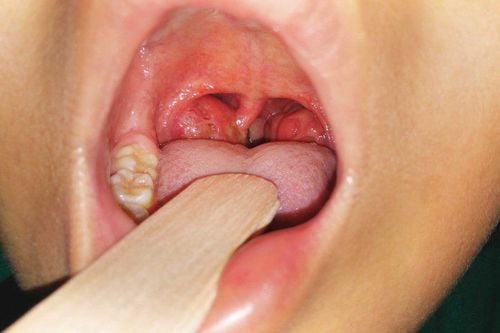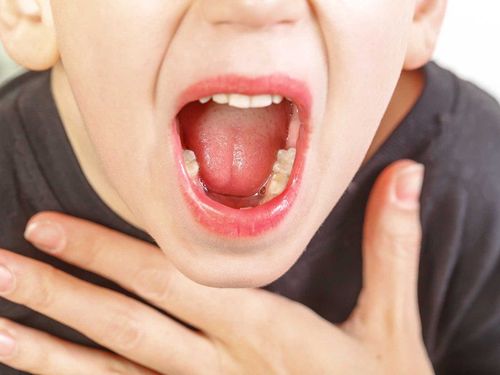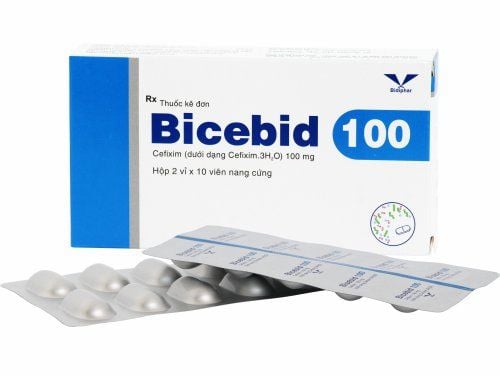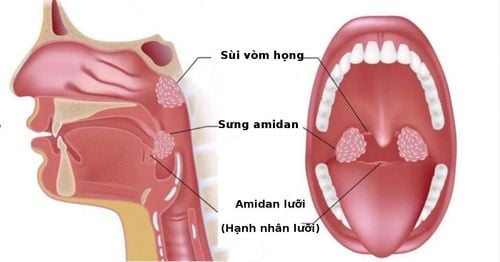This is an automatically translated article.
The article was professionally consulted by Specialist Doctor II Dinh Van Loc - Department of General Surgery - Vinmec Danang International General Hospital.
Tonsillectomy is considered a minor surgery, the interventions are not complicated, however, tonsillectomy for children is always a big concern for many parents.
1. What is tonsillitis?
Chronic tonsillitis is an inflammation of the throat that often causes discomfort, pain, and repeated inflammation of the palatine tonsils depending on the level of inflammation and the body's response. When the tonsils are inflamed, they can become enlarged (also known as hyperinflammation), which is common in children and young people, or the tonsils can become small (called atrophic sclerosis).Tonsillitis can appear in all subjects and make the patient very uncomfortable. This is a benign disease and has many cures, but tonsillectomy is the method chosen by many people. However, not all patients should have their tonsils removed. To protect your health, it is best to perform tonsillectomy only when:
The patient has chronic tonsillitis, has taken medicine for a long time but has not yet recovered from the disease. The tonsils are inflamed and swollen, making it difficult for the patient to breathe. Patient has strep throat. The disease recurs many times. When should tonsils be removed in children?
Parents often worry that after tonsillectomy or VA curettage, the body's immunity will decline. However, it should be noted that the VA and tonsils only have a certain role in the body's immune barrier, there are many other important organs involved in the immune system. Repeated tonsillitis not only make them lose their immune role, but even become a potential reservoir of bacteria, ready to explode at any time and lead to more dangerous complications. Therefore, for some cases, the appointment of tonsillectomy is absolutely necessary.
Tonsectomy will be indicated in the following cases:
Repeated tonsillitis (more than 5 times/year) greatly affects children's learning, health and quality of life Tonsillitis causes complications such as bronchopneumonia, myocarditis, glomerulonephritis, arthritis,... Enlarged tonsils cause airway obstruction, difficulty swallowing, difficulty speaking, snoring or even apnea.
2. Is tonsillectomy for children anesthesia?
For successful tonsillectomy, with the best coordination from the child, to avoid pain, the doctor will choose endotracheal anesthesia.
Bác sĩ tiến hành gây tê tại chỗ để cắt amidan cho trẻ diễn ra thuận lợi nhất
What does your child need to prepare before anesthesia?
Before anesthesia, your child will need a general check-up. At this point, the Anesthesiologist will review your child's childhood history and current health. This can happen right before or on the day a child needs surgery, tests, or treatment. It is important that you tell the Doctor about any of the following if your child has them:
Allergies to foods, drugs or rubber. All medications your child is taking. Breathing problems. Includes asthma, croup or wheezing. In addition, it should also be reported if the child snores or has sleep apnea. Recent illnesses, especially colds or fevers. Problems your baby had at birth. Examples include a premature birth, a stay in the neonatal intensive care unit, or a birth defect. Heart disease. Other medical problems your child has had. Especially if your child needs to go to the doctor or stay in the hospital. The child has been given anesthesia for a previous surgery or test. Symptoms associated with anesthesia or surgery such as shortness of breath or nausea and vomiting Familial problems with anesthesia, bleeding disorders. If your child has loose teeth. Sometimes, loose teeth must be removed during anesthesia. This is to ensure the safety of your child. The operating room nurse will take you and your baby to the pre-anesthesia room. Your child may bring a toy or a pacifier to suck on. It is possible that your child will breathe in anesthetic gas and will receive an injection of anesthetic through an intravenous catheter. If both methods are safe for your child, which method can you choose to use? If the anesthetic is given by gas, the anesthetic gas will smell like a felt-tip pen. Anesthesiologists usually wear a mask to give gas anesthesia. If the child is anesthetized with gas, it may take a few minutes for the child to be anesthetized. The child may become agitated as the anesthetic begins to work. If anesthesia is given intravenously, it is usually quicker. Some parents are concerned about their baby's pain during injections. What happens next?
Your child will be taken into the operating room for surgery or examination. The anesthesiologist will closely monitor your child's blood pressure, pulse, temperature, and breathing rate during the procedure, making sure he's safe and completely unconscious. Anesthesia gas and/or intravenous medication will keep your child in a state of anesthesia.
3. How long is the recovery time after tonsillectomy?
Tonsillectomy is also considered surgery, causing more pain and stress to the child's body. So it takes about 2 weeks for the throat to fully recover and the baby to return to normal.Children may experience temporary voice changes due to changes in the size and shape of the oral cavity after tonsillectomy. After surgery, the baby's nasal voice can last a few weeks to a few months, then it will return to normal after a while, so parents can rest assured when they see the child's voice change.

Trẻ em cần khoảng 2 tuần để phục hồi sức khỏe sau phẫu thuật
4. Child care before tonsillectomy
For the best minor surgery, parents should pay attention to the child's care as follows:4.1 Before removing tonsils for children 7-10 days before surgery, parents should not arbitrarily give children non-steroidal anti-inflammatory drugs such as non-steroidal anti-inflammatory drugs such as: Ibuprofen, Indomethacin, and Naproxen, unless directed by your doctor. If yes, list any medications the child is taking during the 10 days prior to surgery. Follow the doctor's instructions about the last time your child is allowed to eat or drink before going to the hospital for tonsillectomy. After this time, absolutely do not give the child anything to eat or drink. Creating comfort for children 4.2 Tonsillectomy procedure Tonsillectomy usually lasts from 30 to 60 minutes. The child was anesthetized through a mask, then intubated into the throat and carefully monitored by the nurse during the surgery. Tonsillitis is removed through the mouth so parents can rest assured that there will be no incisions in the face or neck.
The amount of anesthetic will be given at the level appropriate for the tonsillectomy. After the surgery is over and the child will be awake and stable, the anesthesiologist will endotracheal intubation, and the child will continue to be monitored in the postoperative room.
After completing the surgery, the child will continue to be monitored in the postoperative room for 1-2 hours until he is awake and stable, he will be transferred to the usual ward or can go home.
Your child may vomit thick brown fluid because he or she has swallowed some blood during and after surgery. This is normal. If the child continues to vomit, the doctor should be informed immediately.

Theo dõi tình trạng sức khỏe sau phẫu thuật trước khi đưa về nhà
4.3 Care after tonsillectomy for children Give children plenty of water to drink to avoid dehydration, dry throat causing pain in children. After drinking or eating liquids without vomiting, you can switch to solid foods and gradually your child can return to a normal diet. Limit your child to eat hard cakes such as cookies, toast,... to avoid scratching the area after surgery Do not eat, drink cold drinks,... Limit talking, rest for the first few days . The choice of tonsillectomy surgery method for children is very important and greatly affects the patient's ability to recover.
At Vinmec International General Hospital, the technique of tonsillectomy and curettage is applied by Coblator. The advantages of this technique are fast surgery time, no blood loss, good hemostasis, less postoperative burns, no swelling, and gentle postoperative process. With Coblator, the patient is much less painful than traditional surgery and surgery with unipolar or bipolar electrocautery, can recover quickly after 4-5 days of treatment.
Doctor Dinh Van Loc graduated as a General Doctor in Hue in 1990, graduated as a Specialist Doctor in 2003 and a Specialist Doctor in Anesthesiology and Resuscitation in 2017. Dr. Loc received advanced training in Anesthesiology. Anesthesiologist and has more than 23 years of experience in pediatric intensive care anesthesia, cranial nerve anesthesia, anesthesia resuscitation for liver surgery, esophagectomy at the hospital.
To register for examination and treatment at Vinmec International General Hospital, for detailed information and to book an appointment for medical examination and consultation, customers can call the hotlines of the hospitals or register for an online consultation with Vinmec International General Hospital HERE.














